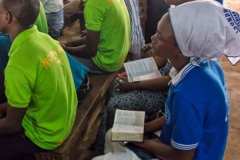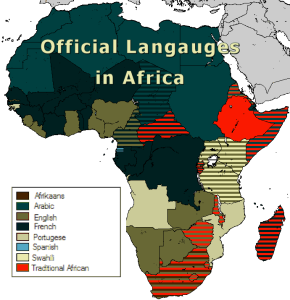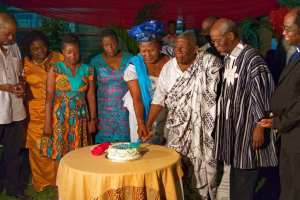This week is Banned Books Week which is an annual celebration of the freedom to read, first celebrated in 1982. I don’t like everything that everyone celebrates during banned books week, but I would like to celebrate a particular case.
Do you know what country mounted a military operation, including deploying its navy to prevent a book from being imported into the country? And do you know what book that might be?
Given the subject of this blog, you have probably guessed that the banned book was the Bible.
Years before the King James translation was commissioned, some wool merchants secretly sponsored an Oxford scholar named William Tyndale to do a translation of the Bible into English. But King Henry VIII and Cardinal Wolsey, the head of the church, banned the Bible in English. Not only that, they set up a network of spies to seek out translators, arrest them and burn them at the stake. So Tyndale fled to continental Europe where he completed his translation and had it printed. But King Henry VIII and Cardinal Wolsey heard of Tyndale’s translation and that he was planning to smuggle into England. Their reaction was dramatic. Here’s what Melvyn Bragg wrote about it in his book The Adventure of English:
It now seems quite extraordinary, but the whole country was put on alert. In order to prevent the word of God in English landing in the land of the English, naval ships patrolled the coastal waters, boats were stopped and searched, men were arrested and a great many Bibles were intercepted. The action taken was indistinguishable from being on a war footing and to Henry VIII and Wolsey it was just that. Latin was the only word of God allowed by the state and now the state came out in full armed force to defend its most loyal ally, the Church.
There are two competing ideas about religious truth. One is that it is known by experts who tell the rest of us what we should believe. That was the view of Henry VIII and Wolsey, one they were willing to defend to the extent of deploying the military. For them, the Bible should be in Latin and accessible only to the clergy who would interpret it for everyone else. Lamin Sanneh points out that this idea is found in some cultures:
In many traditional societies, religious language has tended to be confined to a small elite of professionals.
In contrast to this view, Tyndale held the view that God created every person with the ability to know what is true when they have the Word of God to consult and the Holy Spirit to guide them. Tyndale subscribed to that idea. To a member of the clergy critical that he was translating the Bible into English, he said:
If God spare my life, I will see to it that the boy who drives the plowshare knows more of the scripture than you, Sir!
The Christian approach to translatability strikes at the heart of such gnostic tendencies, first by contending that the greatest and most profound religious truths are compatible with everyday language, and second, by targeting ordinary men and women as worthy bearers of the religious message.
Jesus said:
“When the Spirit of truth comes, he will guide you into all truth.” (John 13:16)
“Make them holy by your truth; teach them your word, which is truth.” (John 17:17)
Today, few Christians subscribe openly to the idea that we should blindly follow religious experts. But sometimes our actions are not fully aligned with the idea every person can know the truth when they have the Word of God to consult and the Holy Spirit to guide them. I have seen missionaries and churches willing to put resources into propagating their doctrines but not into giving people the Word in their language. That approach is closer to Wolsey’s than it is to Tyndale’s. I have full confidence that making God’s Word widely accessible is good for Christian faith, the church, families and all of society. Research into the impact of Bibles in Ghanaian languages confirms this.
During banned books week, let’s celebrate Tyndale. Let’s also check the practices of our churches and missionary endeavors to make sure that they do not subtly elevate something else to the place where it eclipses the Bible.






